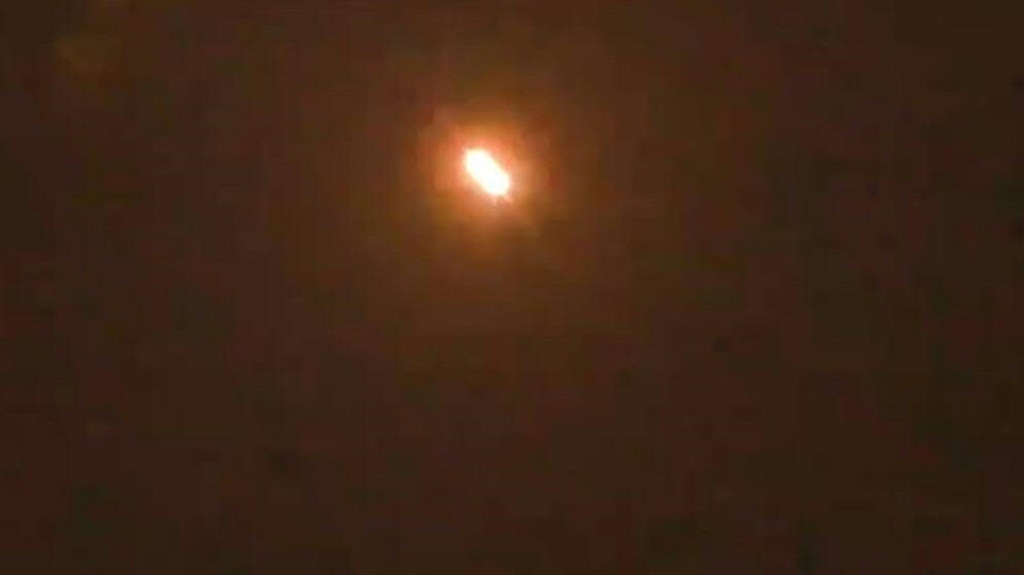
However, the greatest threat in this circumstance is not escalation as such, it’s Iranian victory.
Iran fired more than 300 drones and missiles against Israel. There were more than 150 drones, some dozens of cruise missiles and more than a hundred ballistic missiles.
The Israeli air defence, bolstered by the US, Britain, France and, importantly, Jordan, was equal to the task and the Israelis claim to have knocked out 99 per cent of incoming missiles and drones.
There was some damage to an Israeli military base and no Israeli fatalities.
This seems to be a calibrated attack by Iran. Notably, there was no simultaneous barrage of rockets at Israel from Hezbollah in southern Lebanon. Had Hezbollah joined Iran’s attack the prospect of even Israel’s legendary Iron Dome being overwhelmed would have risen dramatically.
So what exactly was Iran trying to achieve? Let’s look at the reaction for a start. It took barely a few hours for the key question on CNN, BBC and similar platforms to change from outrage at Iran’s attack to demands that Israel exercise restraint.
The BBC was asking its interlocutors: What can regional nations do to stop Israel from escalating the situation? Attack Israel militarily, and Israel is immediately attacked politically.
Most leading Western nations’ leaders not only condemned Iran but, initially at least, expressed complete solidarity with Israel.
This was a bridge too far for the Albanese government, of course. It condemned the Iranian attack, but conspicuously refused to say it stood with Israel. It apparently doesn’t want any pesky grabs of wholehearted support for Israel, even when under direct Iranian military attack.
And remember, that is direct military attack from a nation that is on the brink of acquiring nuclear weapons, that is the biggest state sponsor of terrorism in the world, and that has for years pledged as national policy the ambition to “wipe Israel off the map”.
US President Joe Biden, notwithstanding his differences with Israeli Prime Minister Benjamin Netanyahu, offered “iron-clad” support for Israeli security.
But Biden also tried to tell the Israelis they had already had a military victory by shooting down the incoming missiles. Therefore, so the logic seems to go, there would be no need for Israel to make a military response to Iran.
There were reports, still somewhat unclear, that the US has said it will help Israel in any defensive measure it takes against Iran, but US forces will not participate in any offensive military actions against Iran.
Washington is apparently also urging Israel not to react militarily or, if it does, to do so at the lowest possible level of military intensity.
Israel has received a solid 12 hours of political and moral support from Western leaders. But, as with the Albanese government, it looks like very shaky support.
So again, what are Iran’s likely motives? Iran has been able to rely on weak and profoundly misconceived policy from Biden, as it experienced from Barack Obama. Biden, like Obama, has devoted vast resources to trying to woo Iran, whereas Donald Trump, for all his manifold sins, pursued a much more effective and necessary policy of containing Iran.

As a result of Biden’s poor Iran policy, Tehran is much stronger today than it was under Trump.
Will the Biden administration finally abandon this disastrous policy and make a serious effort, through sanctions, against the Iranian economy?
Iran is also much stronger today because of its de facto alliance with China and Russia, neither of whom, naturally, condemned the attack. If Iran can make this direct attack on Israel and receive either no military response, or no effective response, it has won a great victory.
Every Arab, Iranian and North African, and Western leftie who hates Israel, will see Iran as its only effective state enemy. In the twisted view of Israel haters everywhere, this will give Iran great prestige.
Hamas in Gaza always wanted an Iranian and a Hezbollah axis to open up against Israel. This had not been forthcoming, with sporadic fire from Hezbollah and only the Houthis in Yemen, among Iran’s various proxies, mounting a full-scale campaign against Israel. This strike may be related to Iran being determined to continue its leadership of its proxies, to show it has some direct skin in the game against Israel.
It might also be designed in part to derail any ceasefire in Gaza. Israel continues to bleed international support while the Gaza conflict continues, with all the international pressure on Israel and virtually none on Hamas. Iran will be happy for this to continue.
Iran has also threatened that it will directly attack US installations in the Middle East if Washington in any way supports Israeli military action against Iran.
Here again, Iran’s deterrence of the US seems to be working, while US deterrence of Iran is not.
The bottom line is it’s very difficult to imagine that Israel doesn’t strike Iran in some way at some point. Iran then would be tempted to push the Hezbollah button. As the Middle East demonstrates again and again, things are never so bad that they can’t get worse.








The historic significance of Iran engaging in its first direct attack on Israeli territory marks a new phase of conflict in the Middle East. The threat of escalation throughout the Middle East into a far wider war is intensified, but still seems reasonably unlikely.